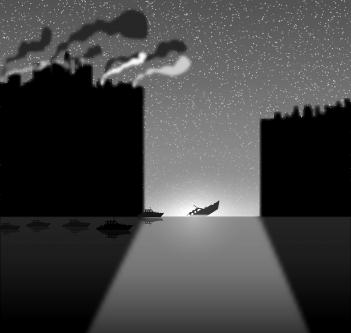Sad what these children are going through. What is to become of so many who are in a strange country on their own?
Mon, May 09, 2016
Homesick, lonely, sleepless; these are the lucky child refugees
The scale of the struggle faced by young arrivals trying to adapt to a new country is revealed as Britain prepares to accept more unaccompanied youngsters
By Mona Mahmood / The Guardian

Illustration: Yusha
Kawkeb Hassan has started sucking her thumb again. It is a comfort thing. The nine-year-old wakes in the night crying and misses school a lot. Her brother Rassim, who helped her escape the perils of Damascus for the uncertainties of a future in Vogtei, central Germany, is worried.
“She watches cartoons, but if there’s a scene where children are having meals with their parents she bursts into tears and switches off the TV,” he said. She eats little.
“She keeps asking me to take her back to her parents in Lebanon,” he said.
Things are little better for 11-year-old Ali al-Shafa’i, who is trying to settle in Gothenburg, Sweden, after an epic 3,219km journey across Europe from Syria. His uncle and chaperone bought him a bird — a curlew, to be precise, but when they were out one day, the neighbor’s cat ate it. Ali was inconsolable.
“I was so upset I can hardly restrain myself whenever I see the cat,” he said, “but I couldn’t touch it because I like cats too.”
More than 370,000 child refugees arrived in Europe last year, about 90,000 of them unaccompanied, the vast majority from Afghanistan, Syria, Eritrea and Iraq. However, after treacherous sea journeys, monumental hikes and the dangers of the road, the hardest bit might yet be ahead: settling in.
Insomnia, homesickness, separation anxiety and culture shock unsettle all but the most robust souls, according to interviews conducted with child refugees by the Guardian in recent weeks. And though they might have left the bombs and militias behind, there are new threats.
Continue reading at:
Homesick, lonely, sleepless; these are the lucky child refugees - Taipei Times?
Mon, May 09, 2016
Homesick, lonely, sleepless; these are the lucky child refugees
The scale of the struggle faced by young arrivals trying to adapt to a new country is revealed as Britain prepares to accept more unaccompanied youngsters
By Mona Mahmood / The Guardian

Illustration: Yusha
Kawkeb Hassan has started sucking her thumb again. It is a comfort thing. The nine-year-old wakes in the night crying and misses school a lot. Her brother Rassim, who helped her escape the perils of Damascus for the uncertainties of a future in Vogtei, central Germany, is worried.
“She watches cartoons, but if there’s a scene where children are having meals with their parents she bursts into tears and switches off the TV,” he said. She eats little.
“She keeps asking me to take her back to her parents in Lebanon,” he said.
Things are little better for 11-year-old Ali al-Shafa’i, who is trying to settle in Gothenburg, Sweden, after an epic 3,219km journey across Europe from Syria. His uncle and chaperone bought him a bird — a curlew, to be precise, but when they were out one day, the neighbor’s cat ate it. Ali was inconsolable.
“I was so upset I can hardly restrain myself whenever I see the cat,” he said, “but I couldn’t touch it because I like cats too.”
More than 370,000 child refugees arrived in Europe last year, about 90,000 of them unaccompanied, the vast majority from Afghanistan, Syria, Eritrea and Iraq. However, after treacherous sea journeys, monumental hikes and the dangers of the road, the hardest bit might yet be ahead: settling in.
Insomnia, homesickness, separation anxiety and culture shock unsettle all but the most robust souls, according to interviews conducted with child refugees by the Guardian in recent weeks. And though they might have left the bombs and militias behind, there are new threats.
Continue reading at:
Homesick, lonely, sleepless; these are the lucky child refugees - Taipei Times?